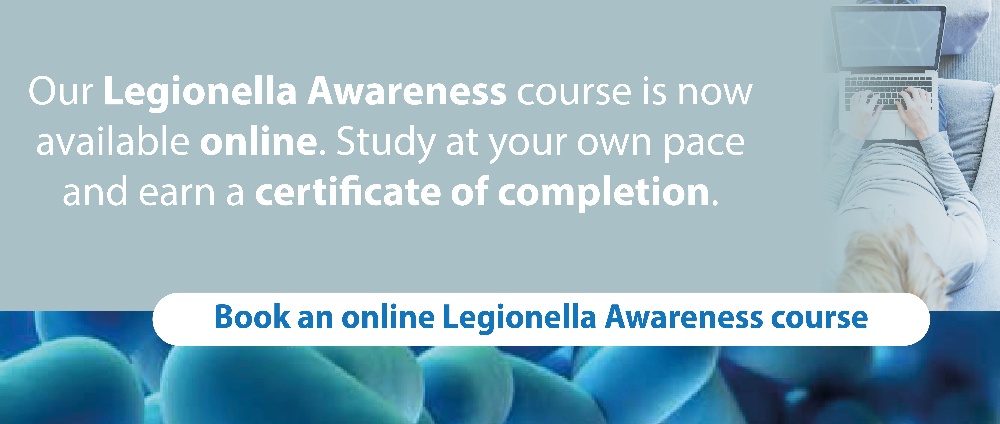
When we consider the importance of adequate Water Hygiene Legionella training, it may first of all be prudent to acknowledge that ‘ignorance is not a defence’ in the eyes of the law…!
Legionella Training - Who is responsible?
Duty holders have the responsibility to maintain a safe estate in order to adequately protect occupants from waterborne pathogens such as Legionella and associated disease. Failure to do this may result in prosecution (even in the absence of a Legionella incident or outbreak), contingent upon the extent of non-compliances/water management failings that have been identified within a given estate.
Legionnaires’ Disease is considered a preventable disease by virtue of the fact that we design and build complex estates that in turn may facilitate the growth of Legionella bacteria to a level that represents a risk to public health. It’s therefore the Landlord/Dutyholders responsibility to ensure that the estate is suitably managed in order to mitigate this risk – as far as reasonably practicable.
To assist the Dutyholder and estates maintenance teams with fulfilling these health and safety requirements, prescriptive guidance notes may be used to underpin site-specific written schemes of control or water safety plan for the safe management of both health and non-health estates.
Legionella Training - What does the guidance say?
The Approved Code of Practice (ACOP L8) and HSG274 provide detail of how to safely manage non-health estates in accordance with the Health and Safety at Work etc. Act 1974 (enforced by the Health and Safety Executive (HSE)), whereas documents such as the Healthcare Technical Memoranda (HTM04-01) and Health Building Notes (HBN) in part, provide guidance on the safe management and commissioning of health estates in accordance with the Health and Social Care Act 2012 (enforced by the Care Quality Commission (CQC)).
Whilst this may appear to delineate some of the subtle differences between health and non-healthcare standards, it would be important to note that many of the healthcare references are underpinned by ACOP L8 and HSG274, so it’s important that managers of ‘health estates’ recognise the importance of having a good working knowledge of ‘both’ health and non-healthcare standards. Moreover, in the event of a Legionella investigation within a health estate it’s very likely that the HSE will lead the investigation with support from the CQC, so it’s important to understand the standards that are expected to be met (or exceeded…) from both enforcement bodies.
It is critical for Dutyholder’s to have a sound understanding of these support documents to ensure that estates operational/technical plans are fit for purpose and suitably address water risk associated with a given estate – in support of ‘stat compliance’. If however, the Dutyholder does not have the requisite competencies to draft, implement and update (where required) such operational technical plans (written scheme/water safety plan), then this authority may be devolved to a nominated competent person within the organisation – formally appointed in writing by the Dutyholder as the Responsible Person for Water (RP[W]).
How to check for competency?
Defining ‘competence’ is therefore of significant importance and should ideally follow the ‘skate’ principle:
- Skills/skillset
- Knowledge
- Attitude
- Training
- Experience
Whilst the HSE describe competence as “the combination of training, skills, experience and knowledge that a person has and their ability to perform a task safely”, competence in health and safety should be seen as an important part of ‘workplace activities’ rather than an add-on or afterthought.
Further reading> University, College and School Legionella Training
Therefore, when identifying a suitable ‘competent person’ (RP[W]) for water management within an organisation, that person will ideally have a holistic approach to associated health and safety, not just task specific. This requires time and investment in continuous improvement – including but not limited to the undertaking and completion of relevant competency based water hygiene legionella training and appraisals – to help ensure that the safe running of the managed estate is ongoing.
Conversely, the formal appointment of inappropriate poorly trained individuals in such a management capacity may lead to gaps in the estate service provision – representing a risk to public health and resulting in legal action being taken against an organisation.
> "Legionella training courses guide" >
Feel free to reach out if you have any questions about this blog or if you would like to consult with one of our experts for further advice on water hygiene.
Editor’s Note: The information provided in this blog is correct at date of original publication – January 2021.
© Water Hygiene Centre 2021








